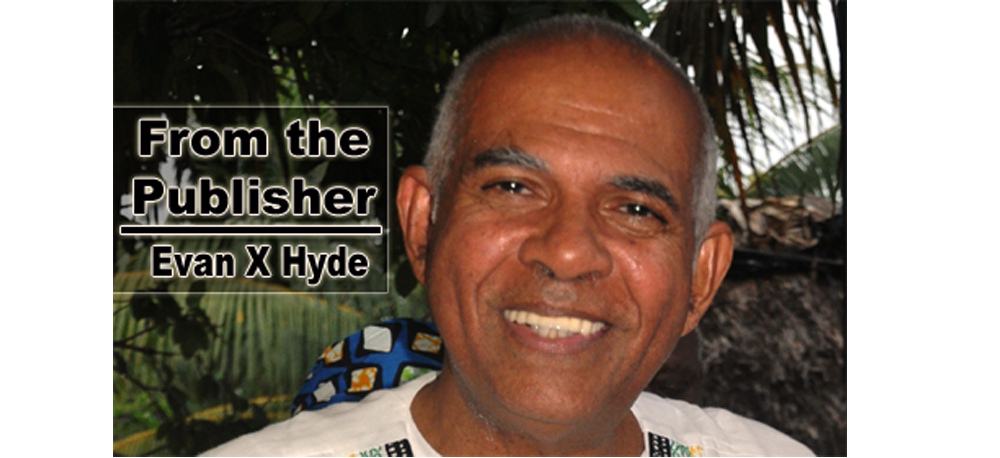The Cuban people have recently been going through great suffering, ranging from serious food shortages to terrible electrical blackouts, followed, if that was not enough, by a small hurricane which recently claimed six lives.
Cuba is just ninety miles away from the United States (Florida), and it is very near to Jamaica and Haiti in the Caribbean Sea. The kingdom of Spain used to rule Cuba, while Great Britain muscled Jamaica away from the Spanish in 1655, and Haiti was being controlled by France.
My understanding is that the bulk of Cuba’s problems derive from a crushing embargo imposed by the United States, sanctions under which the Cuban people have been struggling for six decades.
The United States went to war with Spain in 1898 to seize Cuba, the Philippines, Guam and other possessions. But when Fidel Castro overthrew the dictator Fulgencio Batista in the beginning of 1959, he soon began to disagree with the U.S., and then Fidel declared that he was a communist, whereupon the Americans trained some Cuban exiles in Guatemala to invade Cuba in 1961. The invasion failed.
Castro was a man of exceeding courage, and he convinced the Russian leader, Nikita Khrushchev, to install nuclear missiles on the island to defend his revolution from the American juggernaut. This resulted in the historical drama in October 1961 known as the Cuban Missile Crisis. This was resolved when the U.S. president, John F. Kennedy, agreed to remove American nuclear missiles from Turkey, which is close to Russia, in return for the Russians moving their missiles out of Cuba. Fidel was angry about the Russians’ caving in to the Americans, which was the way it appeared to him.
The American power structure ever since then has made it a priority to crush Cuba, and the Cuban people have stood firm in their resistance. Under Castro and communism, the Cubans achieved great successes in education, biotechnology, and military support for people fighting against imperialism, such as the Africans fighting apartheid in southern Africa. But the Cuban people have paid an enormous price for their courage and their principled stands.
Cuba has been a great friend to Belize, and Belize has reciprocated where our leaders’ rhetoric is concerned. Belize, of course, is not in a financial position to assist Cuba, but there is a consideration other than the financial one. That consideration has to do with our national psyche, or perspective. We Belizean Creoles, specifically, have a Brer Anancy outlook. That is to say, we believe in wiggling our way out of crises through the use of our brains and “tricknology.”
Now it is the case that many Cubans have fled from communist Cuba since the 1959 Cuban Revolution to live and work in the United States, mostly in Florida, where they have done very well for themselves and comprise a very powerful anti-Castro/Cuba political lobby.
People tell me that Cuba remains somewhat racist where its treatment of Cubans of African descent is concerned, but it has always appeared to me that Cubans of a darker hue have generally found life more palatable under the Cuban Revolution than before it. I know that Cubans of African descent have been prominent in Cuba’s military support of anti-colonial struggles all over the planet.
But, back to us. It appears that the majority, or a large percentage, of Belizean Creoles have migrated to the United States, where they have apparently done well for themselves. The American military is always an option for Belizeans, especially after the mid-1970s when the Americans abolished their compulsory military draft for Americans when they reached their 18th birthday. American youth began to rebel against the draft during the Vietnam War in the 1960s, and their rebellion was nationwide and it was violent. The American government decided to abolish the draft. This decision has worked out well for the Americans, and, to repeat, it has created more opportunities for Belizeans. To take advantage of these opportunities, Belizeans have to transfer their loyalty from Belize to the Statue of Liberty.
So, now we turn to the challenges a Belizean patriot, Wil Maheia, has been making to Guatemalans, both civilian and military, at the Sarstoon River. Unarmed in the face of Guatemalan automatic weapons, Maheia has displayed remarkable courage. He has not behaved like the typical Belizean Creole. He has not done the Brer Anancy dance.
In a conversation with Rufus X lately, we discussed the dangers Wil has braved. It is a situation many Belizeans do not want to examine. But, respect should be given where it is due.
The British have an international reputation for military courage. Remember, this island once ran an empire that ruled the world. British courage in the face of withering fire was immortalized in a narrative poem by Alfred, Lord Tennyson, entitled ”The Charge of The Light Brigade”, based on a British cavalry charge against the Russians in 1854 during the Crimean War.
Shakespeare, however, did paint the picture of a classic British soldier without honor, when he created the fictional character of Sir John Falstaff, in HENRY IV, PART ONE. Falstaff’s philosophy was simple: ”The better part of valor is discretion.” (V.iv.120), and ”Honor is a mere scutcheon.” (V.i.142).
Falstaff ran the streets of London with King Henry IV’s son, and they raised a ruckus. But when Henry IV died, and his son became Henry V (1386-1422), he ended his relationship with Falstaff and his crew, and became the man most Britons consider their greatest warrior/king.
A presidential election will be held in the next two weeks in the United States of America, the world’s ruling superpower. The American people are very much divided. The mood there appears ugly. High-powered arms are exceedingly plentiful. If we are to judge from the events of January 6, 2020, Brer Anancy does not have a role to play in the land of Uncle Sam.

